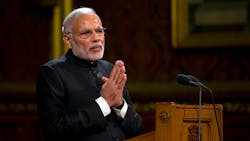NEW DELHI — India’s economy expanded 7.3% in the third quarter of the financial year, official data showed Monday, suggesting it remains on track as the world’s fastest-growing major economy.
The year-on-year expansion in gross domestic product for the three months to end-December represented a slowdown from the previous quarter, but beat a 7.1% median estimate forecast by economists in a Bloomberg survey.
The robust data will provide a boost for Prime Minister Narendra Modi, coming as India’s right wing leader nears two years in power amid mounting calls to enact promised reforms.
India’s statistics ministry on Monday also forecast the economy would grow 7.6% over the full year 2015-16. It sharply revised up the growth rate for the previous two quarters, including raising the figure for the July-September quarter to 7.7%, up from 7.4% reported earlier.
However, several experts questioned the data, saying it did not tally with the signals coming from many sectors of the Indian economy.
“I’m absolutely surprised by this,” said Kunal Kundu, India economist at Societe Generale in Bangalore. “The growth they are talking about becomes all the more untenable on the face of what we are seeing in the coal sector, roads, freight, exports contracting for 13 months in a row.”
Modi has made boosting economic growth a priority since sweeping to power in May 2014, and has been buoyed in recent months by a growth rate that has exceeded that of powerhouse China.
But investors have raised concerns about the pace of promised economic reforms needed to create jobs for India’s tens of millions of young people. The rupee is Asia’s worst-performing currency so far this year as global funds have pulled out of Indian stocks, according to Bloomberg.
“At face value, these are extremely strong figures. The bigger doubts arise when we try to align the GDP data with what we know of the economy’s health from other sources,” analysts at Capital Economics said in a note. “We should take the official GDP data, and the rate of growth they are suggesting, with a pinch of salt.”
Data Revision
Modi’s Bharatiya Janata Party-led government will present its next budget on Feb. 29, with the private sector clamoring for tax reforms to simplify the current regime, among other demands.
India’s central bank kept interest rates on hold last week, citing the importance of controlling inflation, which has ticked up in recent months. The Reserve Bank of India said the benchmark repo rate, the level at which it lends to commercial banks, would remain at 6.75%.
Although it is a much smaller economy, India’s current growth rate compares favorably with that of China, which expanded 6.9% in 2015, its slowest pace in a quarter of a century.
Yet India is still dogged by concerns over the reliability of its economic growth data a year after the government introduced a revised formula for calculating GDP, which some analysts have criticized. The government says the new method of calculating GDP is closer to international standards.
The main change is that India now measures its economic growth at market prices to incorporate “gross value addition” in goods and services as well as indirect taxes.
The base year to calculate India’s GDP has also been advanced to 2011-12 from 2004-05.
By Emily Ford
Copyright Agence France-Presse, 2016
About the Author
Agence France-Presse
Copyright Agence France-Presse, 2002-2025. AFP text, photos, graphics and logos shall not be reproduced, published, broadcast, rewritten for broadcast or publication or redistributed directly or indirectly in any medium. AFP shall not be held liable for any delays, inaccuracies, errors or omissions in any AFP content, or for any actions taken in consequence.
